
ben finney : surfboarding in west africa, 1962
| home | catalogue | history | references | appendix |
 |
surfresearch.com.au
ben finney : surfboarding in west africa, 1962 |
In a
previous
article on surfboarding in Oceanda this sport was considered
in reference
to its distribution in Melanesia, Micronesia and Polynesia
(FINNEY 1959).
At that time
I was not aware that the sport had ever been practised
outside of Oceania
in pre-European times.
Since then,
however,
following from a suggestion kindly made me by Dr. DIETER
SCHORI, I have
had a chance to examine several reports of surfboarding in
West Africa.
In this note
African surfboarding will be briefly discussed, and the
question of its
relationship with surfboarding in Oceania will be
considered.
Actually,
as is
the case in Oceania, it appears that along with
surfboarding, the other
basic forms of surfing, body-surfing (without a board) and
canoe-surfing,
are practised in Africa (BEART 1955: 330-331; ROUCH 1949:
50-52).
However, as
in
the previous article, we are here interested in the most
distinctive form
of surfing, surfboarding.
The African
form
of this sport is well described and illustrated with
sketches and photographs
by ROUCH, who has witnessed young Africans surfing at Yof
and Saint-Louis,
Senegal.
This
description,
along with BEART'S notice of surfing on the Ivory Coast, and
an early nineteenth
century report of the sport at Accra, Ghana (ALEXANDER 1837,
Vol. 1: 192),
would seem to indicate that surfboarding is not a rarity
along the West
African
coast.
What
information
is there then available about a possible genetic
relationship of the African
and Oceanian occurrences of this sport?
To my
knowledge
there is no direct evidence either asserting or denying
historical connection.
Therc are,
however,
several hypotheses which might be explored if we, still wish
to inquire
into the relationship of African and Oceanian surfing.
One obvious
hypothesis
would attempt to derive the African sport from its Oceanian
counterpart
by way of recent diffusion from Hawaii.
The Hawaiian
form of surfboarding, which has spread over the world in the
last half-century
(see FINNEY 1960: 323-326), has recently been introduced to
South Africa
where Europeans have taken up the sport.
However,
ALEXANDER'S
report of 1837 on African surfboarding would seem to exclude
the possibility
of recent introduction.
A corrolary
hypothesis,
that the sport could have been introduced during the
eighteenth and early
nineteenth centuries when European commerce was linking up
such widely
separated parts of the world, also lacks supporting
evidence, although
therc is no documentary evidence to the contrary.
A third
hypothesis,
that which would posit some genetic connection dating from
the pre-European
period, actually leads to the basic issue of this
discussion.
In other
words,
we are faced with the recurrenct problem of ethnological
interpretation,
that of deciding between independent invention and
diffusion.
This same
issue
was brought up in the study of Oceanian surfing, where it
was phrased "...
as to whether the sport was independently invented on
several islands in
Oceania, or whether surfboarding was invented only once, on
one island,
and then diffused over the rest of Oceania (FINNEY 1959:
28)."
In the
discussion
to follow it will be seen that the alternative of the
independent invention
of surfing in Africa and in Oceania is favored over the
possibility of
invention in only one of these areas and then diffusion to
the other.
Page 42
Unfortunately
a
comparison of the actual form of the boards used for surfing
in the two
areas would be of dittle help.
Although the
small boards used in Senegal have the unique feature of a
transverse bar
to provide a grip for the rider, the general form of the
boards from the
two areas would seem to be similar.
Indeed, so
simple
an artifact as a surfboard does not really admit enough
complexity to safely
allow historical inferences based upon similarities and
dissimilarities
in form.
It is in
fact
the very simplicity of the surfboard, and in a sense of the
sport itself,
which provides an argument for the alternative of
independent invention.
As noted for
the Pacific Islanders, who are known for their swimming
ability and love
of the water, " ...the use of a swimming float, or any stray
board, as
an aid in riding the waves would not seem like too great a
step to have
occurred in several places in Oceania (FINNEY 1959: 28)."
For
Africans,
who live along the western coast with its warm waters and
ample surf, and
who apparently take to water sports, the same could have
happened.
This view
that
surfboarding was independently developed in Africa is
apparently held by
BEART (1955: 331), who posits that the small surfboard could
have developed
from the small boards used by boys for playing in the water
which occur
even in regions away from the coast.
A glance at
RATTRAY'S
ethnography of the Ashanti adds weight to BEART'S
hypothesis.
In a series
of
photographs RATTRAY (1923: 60-63) shows long, slender boards
(mpadua)
being paddled by hand around an inland lake by young men
just as a fullsized
surfboard might be paddled on the ocean's surface.
Moreover, it
is interesting to note that on this lake the use of sails,
paddles, oars
and poles are forbidden, apparently leaving the hand-paddled
mpadua
as the main form of water transport (RATTRAY 1923: 63).
It would
appear
then that West Africa shares with Oceania the ideal
conditions under which
surfboarding might develop, that is, warm, surf-filled
coastal waters,
a populace skilled in swimming and interested in water
sports, and the
use of some sort of swimming floats or boards.
For this
reason
the view which supports the independent invention and
evolution of surfboarding
in both West Africa and Oceania is preferred.
Bibliography
BEART, C.
1955 Jeux et
Jouets de l'Ouest Africain. Memoires de l'Institut Francais
d' Afrique,
Noire No. 42, Dakar.
FINNEY, BEN
1959
"Surfboarding
in Oceania: its Pre-European Distribution."
Wiener
Volkerkundiche
Mitteilungen, Jahrgg. 7, Bd. 2, Nr. 1-4, pp. 23-36. Wien.
1960 "The
Development
and Diffusion of Modern Hawaiian Surfing."
Journal of
the
Polynesian Society, Vol. 69, No.4, pp. 315-331. Wellington.
RATTRAY, R.
S.
1923
Ashanti.
Oxford.
ROUCH, JEAN
1949
"Surf-riding
sur la Cote d' Afrique."
Notes
Africaines.
(Bulletin d'Information et de Correspondence de l'Institut
Francais d'
Afrique Noire.)
No. 42,
April,
pp. 50-53. Dakar.
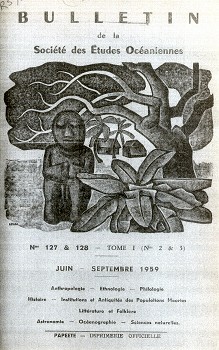 |
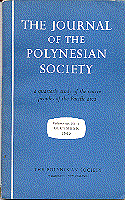 |
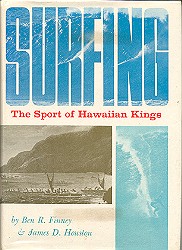 |
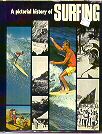 |
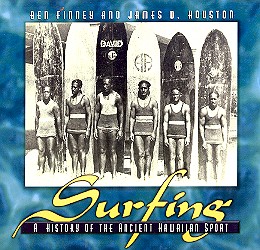 |
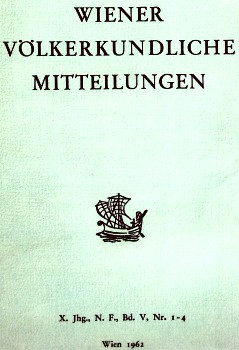 |
Volume 5, Wein, 1962.. Finney,
Ben:
|

| home | catalogue | history | references | appendix |